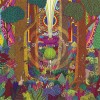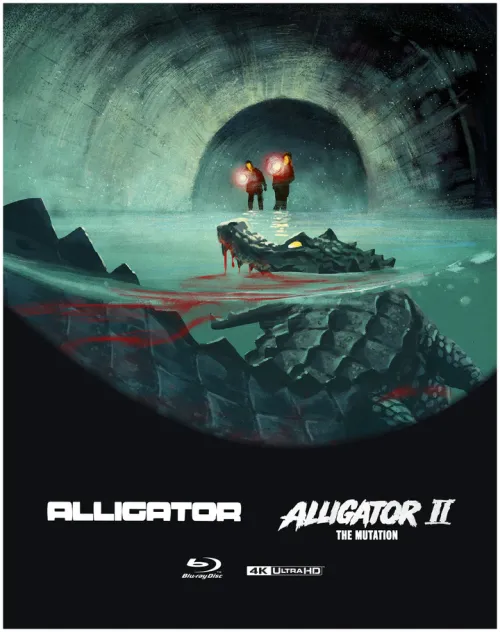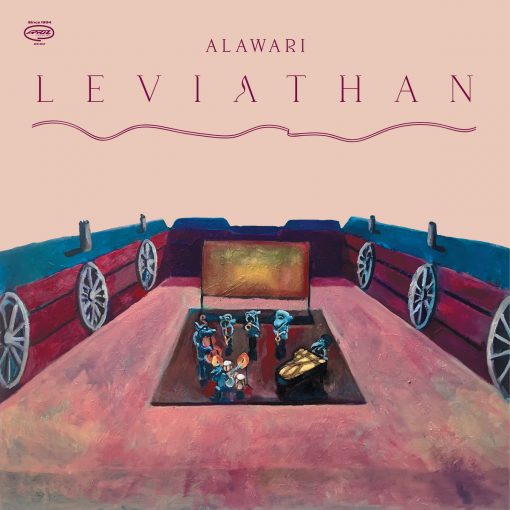 Perhaps unsurprisingly, Mike Gangloff‘s solo record Poplar Hollow (Blackest Rainbow) – here appearing on swirl-patterned vinyl wrapped up in a gloriously psychedelic sleeve, following on from an earlier self-released edition – bridges the sounds of the two groups he is best-known for. Opening with the plaintive violin round “Queen of the Earth,” it’s easy to hear within Gangloff’s deep attachment to and knowledge of the mountain music of his native Appalachia and environs, each swoop and return filled to bursting point with centuries of tradition built on the extremes of poverty, environment and isolation from mainstream America.
Perhaps unsurprisingly, Mike Gangloff‘s solo record Poplar Hollow (Blackest Rainbow) – here appearing on swirl-patterned vinyl wrapped up in a gloriously psychedelic sleeve, following on from an earlier self-released edition – bridges the sounds of the two groups he is best-known for. Opening with the plaintive violin round “Queen of the Earth,” it’s easy to hear within Gangloff’s deep attachment to and knowledge of the mountain music of his native Appalachia and environs, each swoop and return filled to bursting point with centuries of tradition built on the extremes of poverty, environment and isolation from mainstream America.
Gangloff continues to demonstrate his virtuosity on the fiddle and banjo for a good chunk of the album (the trills and saws of “Little Sparrow” are a particular delight), but his time in Pelt also makes itself evident in pieces like “Cat Mountain,” where the drift and drone already present in the mountain music is given an experimental edge and allowed to roam beyond the form. Here, Gangloff starts out trad but drives his banjo into places where maybe Alan Lomax might perhaps have gone and recorded at some strange time. By the end, the music has left the image of bluegrass and beyond which the modern world holds stereotypically true of the mountains far behind in rapid-fire strums and carefully plucks, with time shifting from accelerated to on hold across the space of a few seemingly endless minutes. Likewise the old fiddle tune “Sally Coming Through The Rye” weaves violin melodies over a captured drone, the combined effects of which are reverie-inducing to the utmost.
 For Melodies For A Savage Fix (Important), Mike and Steve Gunn (of GHQ, Desert Heat, Kurt Vile’s Violators and now Black Dirt Oak alongside Gangloff’s fellow Black Twig Picker and Pelter Nathan Bowles) secluded themselves in Topeka, Virginia (a long way from the town’s only traffic signal, apparently), laying down tracks in roots music recordist Joseph Dejarnette‘s farmhouse-cum-studio and very much away from it all.
For Melodies For A Savage Fix (Important), Mike and Steve Gunn (of GHQ, Desert Heat, Kurt Vile’s Violators and now Black Dirt Oak alongside Gangloff’s fellow Black Twig Picker and Pelter Nathan Bowles) secluded themselves in Topeka, Virginia (a long way from the town’s only traffic signal, apparently), laying down tracks in roots music recordist Joseph Dejarnette‘s farmhouse-cum-studio and very much away from it all.
Actually, this is more than good – it’s the kind of great which the acoustic guitar of the American variety cries out for (even if it’s played by a German guitarist like Steffen Basho-Junghans). Ever since John Fahey, Robbie Basho and Leo Kottke woke the world up – quite rudely, in the former case and perhaps slightly against its will – to the prospects which this most deceptively obvious of instruments is capable of opening in the right hands and with the right degree of non-traditional influence (mostly Indian ragas, and here in the hands of Gangloff and Gunn on the exploratory yet still melodic “First of Spring Trio,” of the atonal/avant/improv kind), there have been many followers and adapters worldwide, not least of them being the likes of Glenn Jones, James Blackshaw, Basho-Junghans and Michael Cashmore. Gunn has long ago added his name to that roll of honour, and here he and Gangloff are coming in hard from a decidedly Appalachian direction (with a Brooklyn twist from Gunn) and none the worse at all for that.
This is late night music, whether in the company of friends and a cask of hooch around the fire, or in the local country store to warm up a square dance (Gangloff plays them too). It’s the sound to hear when the dark draws in and the mood to dance picks up; it’s the inflection of a dusty trail left behind when the door shuts out the cold; it’s where the moonlight falls on the moonshine when the dawn breaks and the tape clacks out on the reel (or more prosaically, the hard disc says it’s full… maybe not the right image at all). Melodies For A Savage Fix is rooted and recorded in a countryside which may not be what it was and is doubtless not without its problems, like everywhere, but has cemented its place in a wider imagination a long ways from its blue-hilled, pine-scattered reality and its Hollywood hillbilly representation which is all too often jokey or downright banjo-pickin’ dangerous.What Gunn and Gangloff have striven for here is to broaden that perspective with the aid of their unbounded interest for music from very far beyond their own neighbourhoods, and to make connections – which surely existed before, and will come by again – which strike, strum and pluck chords and drones (even silences and spaces) between cultures. That they have done so without falling into trite ethnodelicisms is to be applauded; and that they have never lost sight of the fact that they are intelligently incorporating influences into an already multiple form is even better.
-Richard Fontenoy-
*As in full of dread; not as in dreadful.


